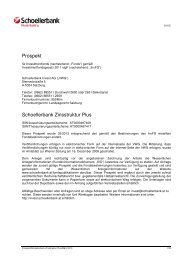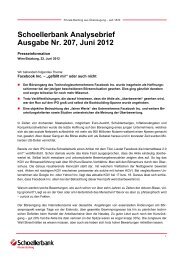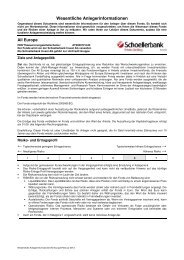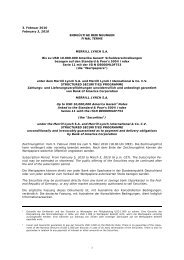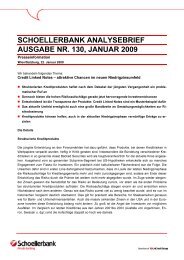Barclays, Base Prospectus 2006
Barclays, Base Prospectus 2006
Barclays, Base Prospectus 2006
Create successful ePaper yourself
Turn your PDF publications into a flip-book with our unique Google optimized e-Paper software.
- 29 -<br />
Risks Relating To The Financial Services Industry<br />
The most significant market risks the Group faces are interest rate, credit spread, foreign exchange,<br />
commodity price and equity price risks. Changes in interest rate levels, yield curves and spreads may<br />
affect the interest rate margin realised between lending income and borrowing costs. Changes in<br />
currency rates, particularly in the sterling-dollar and sterling-euro exchange rates, affect the value of<br />
assets and liabilities denominated in foreign currencies and affect earnings reported by the Group's non-<br />
UK subsidiaries and may affect revenues from foreign exchange dealing. The performance of financial<br />
markets may cause changes in the value of the Group's investment and trading portfolios and in the<br />
amount of revenues generated from assets under management. The Group has implemented risk<br />
management methods to mitigate and control these and other market risks to which the Group is<br />
exposed. However, it is difficult to predict with accuracy changes in economic or market conditions<br />
and to anticipate the effects that such changes could have on the Group's financial performance and<br />
business operations. In addition, the value of assets held in the Group's pension and long-term<br />
assurance funds are also affected by the performance of financial markets.<br />
The Group's authority to operate as a bank is dependent upon the maintenance of an adequate capital<br />
base. It is required to meet capitalisation requirements in the UK and in other markets where banking<br />
activities are undertaken. As the level of capitalisation may affect the Group's debt rating, the Group<br />
also manages its capital to secure the maintenance of its strong rating. Moreover, the absence of a<br />
sufficiently strong capital base may constrain the Group's growth and strategic options. Unforeseen<br />
circumstances may arise under which the Group is unable to maintain its desired capitalisation.<br />
Liquidity risk is the risk that the Group is unable to meet its payment obligations when they fall due<br />
and to replace funds when they are withdrawn; the consequence of which may be the failure to meet<br />
obligations to repay depositors and fulfil commitments to lend. This risk exists in the UK as well as in<br />
overseas markets. There is a risk that the Group mismanages its liquidity or that circumstances may<br />
arise under which it is unable to maintain adequate liquidity.<br />
The Group is subject to extensive supervisory and regulatory regimes in the UK, elsewhere in Europe,<br />
the US, the Asia-Pacific region and in the many other countries around the world in which it operates.<br />
Regulatory compliance risk arises from a failure or inability to comply fully with the laws, regulations<br />
or codes applicable specifically to the financial services industry. Non-compliance could lead to fines,<br />
public reprimands, damage to reputation, enforced suspension of operations or, in extreme cases,<br />
withdrawal of authorisation to operate.<br />
The Group's businesses and earnings can be affected by the fiscal or other policies and other actions of<br />
various regulatory authorities of the UK, other European Union or foreign governments and<br />
international agencies. The nature and impact of future changes in such policies and regulatory action<br />
are not predictable and are beyond the Group's control.<br />
There is continuing political and regulatory scrutiny of, and major changes in, legislation and<br />
regulation of the consumer credit industry in the UK and elsewhere. In the UK, these currently include<br />
a review of store cards by the Competition Commission and investigations by the Office of Fair<br />
Trading into interchange rates and default fees on credit cards. The review and investigations are<br />
looking at the consumer credit industry generally and the Group is co-operating with those<br />
proceedings. Their outcome is unclear but may have an impact on the consumer credit industry in<br />
general and therefore on the Group's business in this sector.<br />
Other areas where changes could have an impact include inter alia:<br />
• the monetary, interest rate and other policies of central banks and regulatory authorities;<br />
• general changes in government or regulatory policy that may significantly influence investor<br />
decisions in particular markets in which the Group operates;<br />
• general changes in the regulatory requirement, for example, prudential rules relating to the<br />
capital adequacy framework;<br />
• changes in competition and pricing environments;



